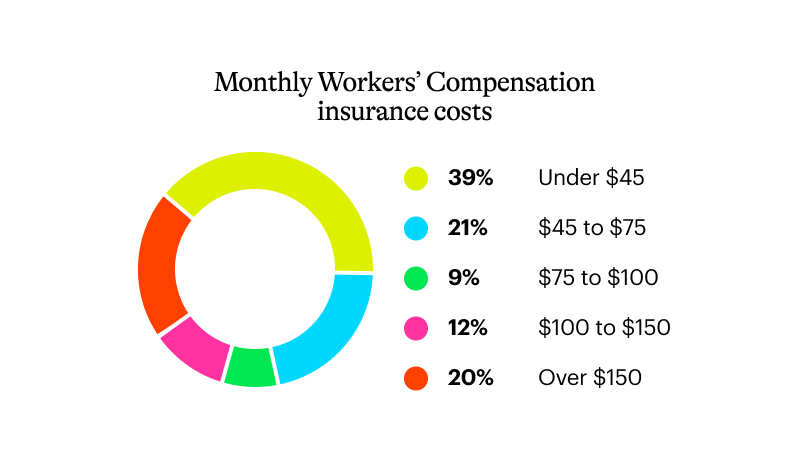However, the lowest premium for NEXT workers’ compensation insurance can start at just $14 per month.†
What you’ll pay for your small business will depend on your industry, location and work experience, as well as your insurance claims history and the policy limits you choose.
To get specific about your cost for a workers’ compensation insurance policy, use our premium calculator or get a free quote.
Examples of monthly median cost workers’ comp insurance cost by profession
Source: NEXT Insurance
How insurance companies calculate the cost of workers’ comp insurance
Insurance companies calculate your premium by considering several risk factors, including:
1. Your type of business or industry
Each job title in an industry is assigned a workers’ compensation classification code by insurance companies. And these codes help insurance companies decide on the risk level for each role.
A workers’ comp premium can depend on the type of work that you do. In general, jobs that have higher-risk opportunities for employees to get injured or ill at work often have higher insurance costs.
If you have a desk job such as an accountant, your workers’ comp policy is probably going to cost less than someone who performs very physical work with tools and machinery that are more risky to employees, such as construction.
2. Your number of employees
If you have five employees, your workers’ comp insurance is most likely going to cost more than if you’re a sole proprietor who works alone.
If you have employees, many states legally require you to have workers’ compensation insurance to cover work-related illness and injuries.
3. Your business location
If you own a bakery in Chicago you’re probably going to pay more for workers’ comp insurance than if you sold bread and cupcakes in a small town in Idaho.
Different states have different regulations. And the more populous the area, it’s more likely you’ll pay a higher premium.
4. Your work experience
The number of years you’ve operated a business in your industry can impact your insurance rate.
For example, if you’ve been a caterer for 12 years without filing a claim, you may pay less than a caterer who’s been in business for one year because you have a proven history of workplace safety and success in your field.
5. Your claims history
Your record of safety, losses and claims can also have an impact on your insurance premium.
For example, if your painter falls off a ladder and suffers an injury that requires a workers’ comp claim for medical costs and/or legal fees, you may see an increase in your insurance rate when it’s time for renewal.
6. How you set your insurance coverage limits
You can elect to have higher insurance coverage limits on your policy to give you more protection over more covered incidents. While more coverage can be a good thing, higher coverage limits can increase the cost of your policy.
Note: These are only a few common factors that affect your cost. Insurance companies take many other external factors into account such as economic conditions and market trends.
3 tips to help lower workers’ compensation insurance cost
You can take control of several actions to help lower your insurance cost, including:
1. Reduce your risk
A physically safe and secure workplace environment can help limit the likelihood of accidents, workplace injuries and filing an insurance claim. And if you take action to reduce harm you’re more likely to keep your premium low.
Consider enhanced safety practices in the workplace and on a job site, such as:
- Installing a fire-retardant sprinkler system.
- Installing more fire extinguishers and smoke detectors.
- Upgrading your security system.
- Minimizing tripping and falling hazards wherever you work.
- Conducting regular safety checks and employee training sessions to keep your employees safe.
2. Learn from previously filed claims
Analyze your previous insurance claims and figure out what you could have done to avoid those events.
For example, if you filed a claim because of employees who suffered a repetitive stress injury on the job, you could train employees to recognize early signs of repetitive fatigue, encourage exercise or physical training to help combat muscular strain or rotate employee tasks to prevent potential pain and injury.
3. Bundle more than one policy
With NEXT, you save up to 10% if you combine more than one type of insurance policy to create a secure business insurance package.
For example, if you add general liability insurance to your workers’ comp coverage, you can benefit from more coverage at a cost savings.






